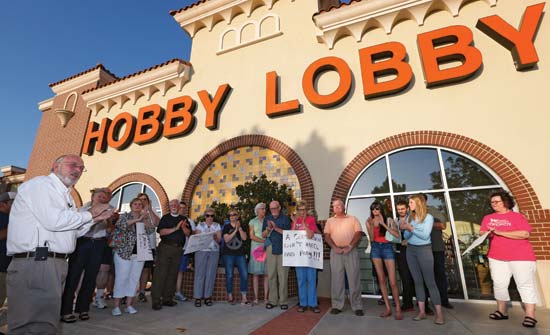In Burwell v. Hobby Lobby Stores, Inc., 573 U.S. ____ (2014), the U.S. Supreme Court had to decide whether the Religious Freedom Restoration Act of 1993 (RFRA) permitted the Department of Health and Human Services (HHS) to require that three closely held corporations provide coverage under the Patient Protection and Affordable Care Act of 2010 (ACA) for forms of contraceptives that violated the owners’ beliefs against the use of abortifacients.
Court exempted corporations from providing coverage for contraceptives
Justice Sonia Sotomayor had denied a preliminary injunction against the law in Hobby Lobby v. Sebelius (2012). But in this case, Justice Samuel Alito wrote the decision for the 5-to-4 majority, exempting the closely held corporations from this part of the law.
RFRA prohibited government from burdening an individual’s religious exercise
The cases were brought by owners of the Conestoga Wood Specialties (owned by Mennonites), and the owners of Hobby Lobby stores, who had similar religious convictions.
The Religious Freedom Restoration Act was adopted in the aftermath of the Court’s decision in Employment Division v. Smith (1990). The law prohibited government from substantially burdening an individual’s religious exercise unless it could show that it furthered a compelling state interest and used the least restrictive means in so doing.
ACA required business to cover contraception
The Patient Protection and Affordable Care Act, as applied by the Health Resources and Services Administration (HRSA), required businesses to provide contraception coverage for methods, including IUDs and morning-after pills, that the businesses considered to be abortifacients. If businesses provided health insurance (as these businesses did), the ACA required they must supply the full range of covered services or pay hefty fines.
Court said corporations were persons under the law
Since the Religious Freedom Restoration Act applied to persons, the Court had to decide whether closely held corporations were legally so classified. Alito ruled that corporations were persons under the law, and that this legal fiction was designed to protect the rights of individuals.
Other cases had already established similar rights for nonprofit corporations, and Alito could see no reason under the law to interpret the law differently for the two. Alito did think it was appropriate to distinguish closely held corporations from publicly traded corporations without similar religious foundations and objectives.
Court said government had substantially burdened religious freedom of corporation owners
Alito believed that the regulations at issue did substantially burden the exercise of religion of the owners of the closely held corporations, who faced the prospect of either providing coverage that violated their owners’ consciences or paying heavy fines. Alito did not think it was the business of the Court to question the sincerity or the content of the owner’s beliefs.
In examining whether the regulations furthered a compelling governmental interest, Alito cited the government’s desire to promote public health and gender equality, but noted that the government had provided exceptions for:
- Churches.
- Nonprofit religious organizations.
- Plans that had been grandfathered in by the legislation.
- Businesses that employed 50 people or fewer.
He further argued that the government had not met the extremely demanding least restrictive means test. He observed that the government could simply absorb the extra costs to take care of the problem.
Court denied decision had broad implications that disssenters feared
Alito denied that exempting coverage in this case would necessarily lead to exempting those who opposed immunizations or who favored racial discrimination. He further denied that the case was equivalent to requiring everyone to contribute to Social Security.
In a brief concurring opinion, Justice Anthony Kennedy denied that the decision had the broad implications that the dissenters attributed to it.
Dissenters said RFRA interpreted too broadly
Justice Ruth Bader Ginsburg authored the dissent, which was joined by Justices Sotomayor, Stephen Breyer and Elena Kagan.
Ginsburg believed that the majority had interpreted RFRA too broadly in in contradiction to the Smith opinion. Ginsburg did not believe that the law should be extended to cover profit-making corporations, which she considered to be very different from churches.
She determined that the link between an employer’s provision of birth-control coverage and the decision of employees to use it “is too attenuated to rank as substantial.”
Moreover, she viewed the interests in providing such coverage to be “concrete, specific, and demonstrated by a wealth of empirical evidence.”
She also rejected Alito’s least restrictive means analysis and feared that the decision would have vast implications for a broad variety of religious beliefs. She believed the decision in United States v. Lee (1952), requiring participation in Social Security despite religious beliefs, was controlling.
Justices Breyer and Kagan did not join the part of the Ginsburg’s decision that would exclude nonprofit corporations or their owners from bringing claims under RFRA.
John Vile is professor of political science and dean of the Honors College at Middle Tennessee State University. He is co-editor of the Encyclopedia of the First Amendment. This article was originally published in 2017.

